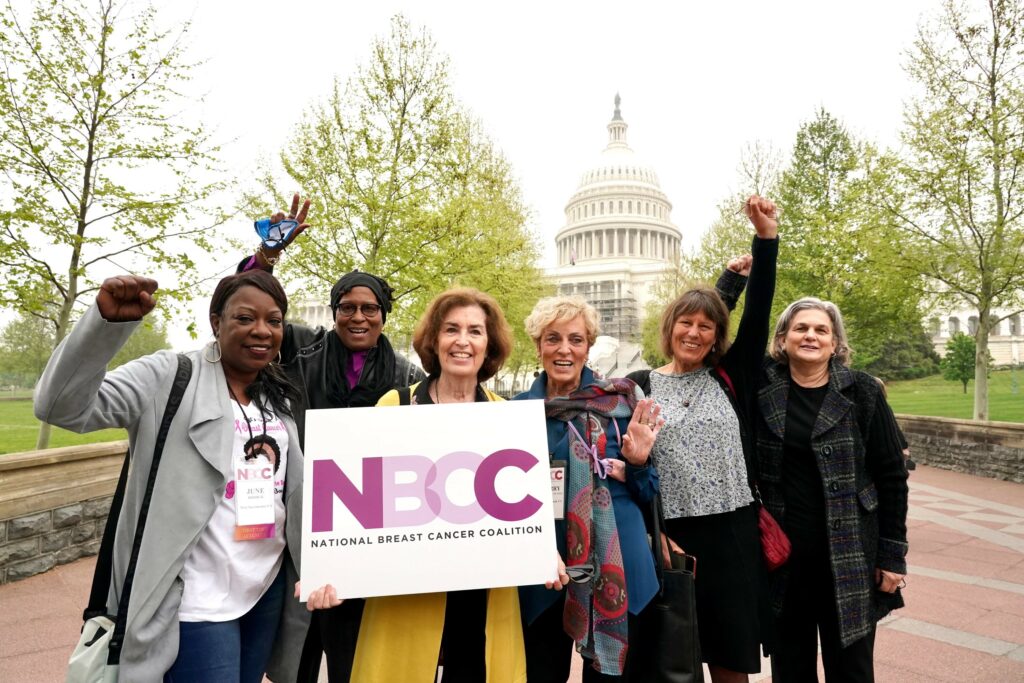Campaign Event Guide
Between town halls, rallies, parades, campaign events, election candidates will be reaching out to communities and voters like you for your vote.
These events offer fantastic opportunities to educate candidates about our platform and seek their support for the National Breast Cancer Coalition’s public policy platform moving forward.

Candidate Town Halls
No matter the venue; you may have the opportunity to interact with a midterm election candidate. Here are some tips for getting across NBCC’s policy platform:
Our three points:
Social Media Guide
Challenging candidates to support NBCC’s policy platform across different social media platforms is an excellent way to connect with candidates and to educate others in your circles about our priorities and why they are essential.

Breast Cancer Caucus 2024 Theme: Take Action to End Breast Cancer
What’s a hashtag? When you post a word or phrase (no spaces) with a pound sign (#) in front, you make that term searchable.
Spread your message on Facebook and Twitter, so you can persuade family, friends, and colleagues to recognize the need for Congress to support NBCC’s public policy platform.
Here are some examples of Tweets and Instagram and Facebook posts that do a great job of communicating our theme and objective for Breast Cancer Caucus 2024!
General:
Candidate-specific:
General:
Breast cancer is a political issue, but it’s not a partisan one. I call on all candidates to endorse @NBCCStopBC‘s policy platform. #2024Election #BCCaucus2024
Calling all candidates in #2024Elections. Have you endorsed @NBCCStopBC‘s policy platform yet? #BCCaucus2024
Candidate-specific:
General:
Breast cancer is a political issue, but it’s not a partisan one. I call on all candidates to endorse @NationalBreastCancerCoalition‘s policy platform. #2024Election #BCCaucus2024
Calling all candidates in #2024Elections. Have you endorsed @NationalBreastCancerCoalition‘s policy platform yet? #BCCaucus2024
Candidate-specific:
Letters to the Editor
Writing a letter to the editor of your favorite local, state, or even national newspaper is a good way to participate in the 2024 election debate and to challenge candidates who have not yet pledged their support for NBCC’s policy platform.

These letters typically have a 200 to 400-word limit. To check your newspaper’s word limit, you can visit its website and check under its “Letter to the Editor” page.
See our sample letter to the editor for the 2022 midterm race. You can personalize these as appropriate with Breast Cancer Facts & Figures. For example, if your newspaper has a larger word limit, you can open your letter by sharing your breast cancer story.
Draft Letter to the Editor
I am a x-year breast cancer survivor (or other connection) and an advocate for the National Breast Cancer Coalition (NBCC), a grassroots organization dedicated to ending breast cancer through the power of action and advocacy.
Breast cancer is STILL an epidemic. There are more than 3.8 million women and thousands of men living with breast cancer in the United States. In 2024, approximately 287,850 new cases of invasive breast cancer will be diagnosed in women; 2,710 cases will be diagnosed in men, and an additional 51,400 cases of ductal carcinoma in situ (DCIS) will be diagnosed in women. An estimated 43,250 women and 530 men will die of this disease this year. We still do not know what causes breast cancer, how to prevent it, or how to stop it from spreading and becoming lethal.
Breast cancer is a political issue that remains an urgent health crisis. Every day elected officials across the country are tasked with making decisions that affect people diagnosed with breast cancer and their families. These decisions include determining the level of funding and resources allocated, how to prevent the disease, and how to ensure accessibility of treatment and care to their constituency. The breast cancer policies being debated at the state and federal levels can mean life or death to you or your loved one with breast cancer. And all women are at risk. While the disease is rare in men, it does happen.
However, breast cancer is not a partisan issue. Candidates on both sides of the aisle need to get behind the National Breast Cancer Coalition’s mission to end breast cancer. We need elected officials who understand the urgency and importance of realizing this mission.
Please join me in urging candidates on both sides of the aisle to demonstrate leadership and commit to making the end of breast cancer a national priority. Visit NBCC’s Breast Cancer Caucus website at breastcancercaucus.org for NBCC’s policy platform and more information on how to get involved. Working together, we can end breast cancer for everyone.
Let NBCC Know About Your Outreach
Keep NBCC updated on your outreach to candidates. Email us at policy@stopbreastcancer.org to let us know if you have placed a letter to the editor or talked to a candidate at a campaign event. If you have any pictures or videos from campaign events, please include them so we can share them.